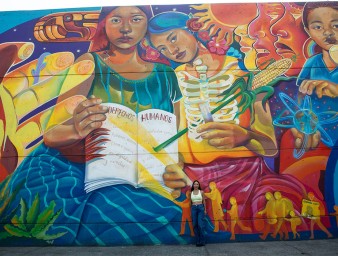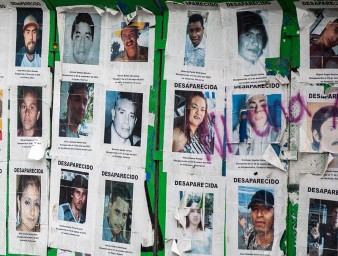“I always wanted to be the voice of my people”
01 November 2024

In June 2017, Indigenous Ñomndaa’ journalist Marcela de Jesus Natalia found herself fighting for her life. A gunman waited for her outside the radio station where she worked and shot her three times.
“I didn't think he wanted to kill me,” she said. “I turned around. The first bullet went to my forehead. I put my hand up, [and] the bullet went in and came out. The second one shattered my jaw. Then this guy held me, dragged me, gave me a final shot in my head and laid me on the pavement.”
Though at first presumed dead, Marcela de Jesús survived the attack and, with the support of lawyers and advocates, as well as of UN Human Rights, continues to fight for justice for the crime perpetrated against her.
Marcela de Jesús was attacked because she angered powerful people by informing Indigenous Peoples about their rights, such as the importance of education, justice, and in particular, violence against women, thus empowering them to fight against historical discrimination against them.
“Journalists who expose wrongdoing and show us the horrific reality of conflict are human rights defenders,” said Volker Türk, UN Human Rights Chief, in a statement commemorating the International Day to End Impunity for Crimes against Journalists, observed every year on November 2. “Attacks against them affect everyone’s right to freedom of expression and access to information, leaving us all less well informed.”
In Mexico, one of the main factors that allows crimes against journalists to go unpunished is that journalistic work is often not considered in criminal investigations, said Jesús Peña Palacios, Deputy Representative of UN Human Rights in Mexico.
“The criminal investigation plays a role of transcendental relevance to ensure the right to truth and justice for survivors, victims’ families, colleagues and society,” he said.
In 2023, 71 journalists and media workers were killed and over 300 imprisoned around the globe, Türk said.
“The widespread impunity that often follows attacks on journalists damages the search for facts and undermines justice,” Türk said. “It creates a climate of fear and leads to more violence against media workers.”
A fearless journalist
Marcela de Jesús is an Indigenous Ñomndaa’ woman born in Xochistlahuaca, in the state of Guerrero, on Mexico's Pacific coast.
From a young age, Marcela de Jesús witnessed violence and attacks by men in positions of power and even the military. It was there that her desire to defend her people was born and she realised that to confront abusers she needed to learn Spanish.
Marcela de Jesús migrated to the state of Oaxaca, and by her own efforts, she managed to continue studying and encountered a radio station that was looking for an Indigenous person from Guerrero who spoke Ñomndaa’ and Spanish and had completed middle school.
“I went behind my husband's back, took the exam and passed,” she said. “I remember that the director [of the radio station] said to me, ‘Why do you want to be an announcer?’ ‘I always wanted to be the voice of my people,’ I answered.”
Later, she returned to the state of Guerrero and got a precarious job as a radio announcer, but with patience and hard work she managed to become the radio manager.
It was after her return to her home state that she began to encounter opposition to her “voice.” Marcela de Jesús was told by powerful people in her town that she was not supposed to inform Indigenous Peoples; that the only thing they were interested in was whether a goat or a cow was lost, and not to get into trouble. She fought against and won lawsuits filed against her for giving Indigenous Peoples news.
“
It is my conviction that my people should be guaranteed the right that is enshrined in the Constitution and in international treaties, that we have the right to information.
“
Marcela de Jesús Natalia, Mexican Indigenous Ñomndaa’ journalist and human rights defender
“They couldn't [silence me] because what is legal is legal. What is morally good is morally good. And that is the reason for the attack against me,” said Marcela de Jesús.
In the face of impunity: protection and justice
According to UN Human Rights in Mexico, at least five journalists and one media worker have been killed and one more media worker was disappeared this year because of their work. This continuous danger in which journalists have had to operate for years, led universal and regional human rights mechanisms to recommend to the Mexican State the creation of a Mechanism for the Protection of Human Rights Defenders and Journalists.
The Mechanism began operating in 2012, following the creation of the Law for the Protection of Human Rights Defenders and Journalists. It aims to guarantee the life, safety and personal integrity of journalists and human rights defenders, including organisations and collectives, who are at risk because of their work.
“In the Mechanism, every year we accompany, with voice but without vote, the deliberation on more than 700 cases in which the necessary protection plans are defined,” said Peña Palacios. “There, we try to reach an agreement with the institutions on the best protection measures, for which we analyse the risks faced by the beneficiaries, the interests that their work affects, and possible perpetrators, among other elements.”
On several occasions the Office in Mexico has taken on the role of mediator between authorities, civil society representatives, and beneficiaries. It has also worked on strengthening the Mechanism through the elaboration of a report that analysed the state of the Mechanism in 2019 and the creation of a Working Group in 2022 to support actions to implement the recommendations listed in the diagnosis.
After her brutal attack, Marcela de Jesús was incorporated into the Protection Mechanism, but not without a high cost to her way of life, as she had to be relocated. While the relocation was necessary to protect her, this has prevented her from continuing to work in radio, informing her people, and has taken her away from her family. Living in an urban environment for the first time has also been a challenge.
“We have accompanied Marcela de Jesús’ case in the Mechanism, to find the best possible protection plan for her,” said Peña Palacios.
After five surgeries, an arduous recovery, and many psychotherapy sessions, in which she even had to relearn how to chew, swallow, speak and move, Marcela de Jesús said she still struggles to obtain dignified and culturally appropriate conditions from the protection measures provided by the Mechanism, as her needs as an indigenous woman of over 60 years old have not yet being thoroughly met.
The gunman who shot Marcela de Jesus has been arrested and sentenced for his crime, but the ones who called for her shooting are still out there. She is hopeful for them to be brought to justice.
“I have a lot of faith that the alleged intellectual author will forget about me. I have faith that nothing is forever,” said Marcela de Jesús.
She added: “Nothing and no one, not jail, not this attack with three bullets, takes away my desire to continue being the voice of my people, to continue with my activism, my defence of human rights. I am fulfilling my dream of being the voice of my people at the national and international level.”



